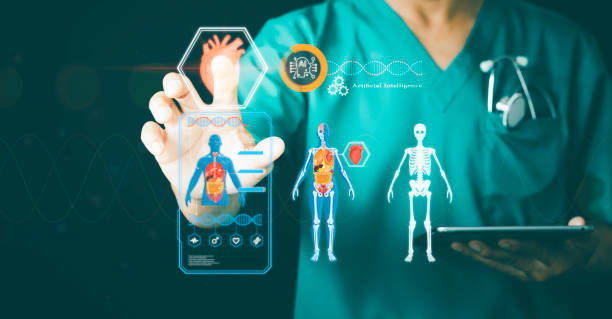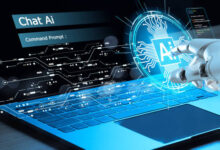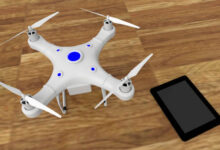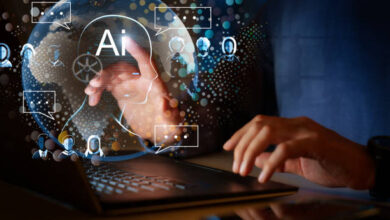Advancements in AI-Driven Medical Diagnosis: Initiating the Future of Healthcare
Leveraging Artificial Intelligence for Accurate and Timely Medical Diagnoses

In the fast-paced world of healthcare, advancements in artificial intelligence (AI) have been transformative, especially in the realm of medical diagnosis.
AI-driven technologies are revolutionising the way medical professionals approach patient care, providing faster, more accurate, and personalised diagnoses.
In this blog post, we will explore the groundbreaking advancements in AI-driven medical diagnosis that are reshaping the future of healthcare.
From leveraging deep learning algorithms to the integration of medical imaging and patient data, these advancements hold the promise of improving patient outcomes and reducing diagnostic errors.
Harnessing the Power of Deep Learning Algorithms for Diagnosis

AI-powered medical diagnosis relies heavily on deep learning algorithms, which enable computers to analyse vast amounts of medical data, learn from patterns, and make predictions.
These algorithms excel at detecting subtle abnormalities in medical images, such as X-rays, MRIs, and CT scans, with exceptional accuracy.
By training on extensive datasets, AI systems can recognize patterns that human eyes might miss, leading to earlier detection of diseases and conditions.
This potential for early diagnosis is critical in various medical fields, from radiology to pathology, where timely intervention can significantly impact patient outcomes.
Improving Diagnostic Accuracy and Reducing Errors
One of the most significant benefits of AI-driven medical diagnosis is the potential to enhance diagnostic accuracy and reduce errors.
Human doctors, despite their expertise, can be susceptible to fatigue, distractions, or biases that might affect their diagnostic abilities.
AI systems, on the other hand, remain consistent and objective, ensuring precise assessments of medical data.
Studies have shown that AI-driven diagnosis has the potential to achieve accuracy rates comparable to or even surpassing human experts in various medical specialties.
By acting as a powerful tool to support medical professionals, AI reduces the risk of misdiagnoses and aids in providing more reliable and confident diagnosis.
Personalized Medicine through AI-Driven Diagnostics
The integration of AI with electronic health records (EHRs) allows for the creation of comprehensive patient profiles that encompass medical history, genetic information, lifestyle, and more.
By analysing this data, AI can help identify individual risk factors and tailor treatment plans to suit each patient’s unique needs.
This concept of personalised medicine has the potential to revolutionise patient care, as treatments can be optimised for better efficacy and fewer side effects.
By considering a patient’s genetic makeup, medical history, and lifestyle, AI-driven diagnostics enable medical professionals to deliver targeted and more effective interventions.
Enhancing Medical Imaging Interpretation with AI
Medical imaging plays a crucial role in diagnosing various diseases and conditions.
However, the interpretation of complex images can be time-consuming and subjective, leading to variations in diagnosis between different radiologists.
AI-powered medical imaging systems can assist radiologists by automating image analysis and providing them with additional insights.
With AI’s ability to identify patterns and anomalies in medical images, radiologists can receive valuable assistance in detecting early signs of diseases, such as cancerous tumours or cardiovascular abnormalities.
This collaboration between AI and radiologists leads to faster and more accurate diagnoses, ultimately improving patient outcomes.
Real-Time Diagnosis and Remote Healthcare
In emergency situations or in remote areas with limited access to medical facilities, AI-driven medical diagnosis can be particularly valuable.
By leveraging AI-powered chatbots or virtual healthcare assistants, patients can receive real-time medical assessments and advice without the need for immediate physical consultation.
These AI-driven virtual assistants can evaluate symptoms, offer basic medical advice, and determine whether a patient requires urgent care.
For individuals in remote or underserved regions, AI-driven medical diagnosis can bridge the gap in healthcare access and potentially save lives.
Addressing Physician Shortages and Workload
The global healthcare industry is facing a shortage of medical professionals, leading to increased workload and potential burnout for physicians.
AI-driven medical diagnosis can help alleviate this burden by handling routine tasks and administrative duties.
By automating tasks like data entry, record-keeping, and preliminary analysis, AI allows physicians to focus on complex patient cases, decision-making, and building stronger patient-doctor relationships.
This improved efficiency can lead to higher job satisfaction among medical professionals and better patient care overall.
Ethical Considerations and Data Privacy in AI-Driven Diagnosis
While AI has transformative potential in medical diagnosis, it also raises ethical considerations surrounding patient data privacy and algorithmic transparency.
As AI systems rely on vast amounts of patient data to learn and improve, it’s crucial to maintain robust security measures and ensure patient consent.
Furthermore, the interpretability of AI algorithms is essential, particularly when they contribute to critical medical decisions.
Ensuring that AI-driven medical diagnosis remains explainable and accountable is vital for building trust between patients, healthcare providers, and AI technology.
Okay guys, let us look into some frequently asked questions (FAQs) about Advancements in AI-Driven Medical Diagnosis.
What are the recent advancements in AI-driven medical diagnosis?
Recent advancements in AI-driven medical diagnosis include improved accuracy in image analysis, faster processing of patient data, predictive analytics, and personalised treatment recommendations.
How does AI contribute to medical diagnosis?
AI analyses vast amounts of medical data, including imaging scans, patient records, and research papers.
Its ability to detect patterns and make data-driven decisions aids physicians in diagnosing diseases more effectively.
Can AI replace human doctors in medical diagnosis?
AI cannot replace human doctors entirely, but it can complement their expertise.
AI acts as a valuable tool, enhancing diagnostic accuracy, reducing errors, and allowing doctors to focus on patient care and complex decision-making.
What benefits can AI-driven medical diagnosis bring to healthcare?
AI-driven medical diagnosis can lead to earlier disease detection, more personalised treatments, reduced medical costs, and improved patient outcomes.
It has the potential to revolutionise healthcare delivery and save lives.
Conclusion
The advancements in AI-driven medical diagnosis are ushering in a new era of healthcare, characterised by improved accuracy, personalised treatment plans, and more efficient patient care.
By harnessing the power of deep learning algorithms, AI is revolutionising medical imaging interpretation, enabling real-time diagnosis, and addressing physician shortages.
While embracing the potential of AI-driven diagnostics, it’s essential to navigate ethical considerations and prioritise patient data privacy.
As AI technology continues to evolve, collaboration between AI systems and human medical professionals will shape the future of healthcare, driving better patient outcomes and revolutionising the way we approach medical diagnosis and treatment.








